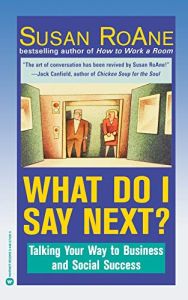Join getAbstract to access the summary!

Join getAbstract to access the summary!
Susan RoAne
What Do I Say Next?
Talking Your Way to Business and Social Success
Warner Books, 1997
What's inside?
Remember when your parents told you that good conversationalists pay attention, don't interrupt, and mind their manners. Turns out, they were right.
Recommendation
Everyone can use hints for making business and personal conversations more effective. Susan RoAne offers the do’s and don’ts, from discussing business during lunch to comforting those in mourning. She even devotes a chapter to effective cyber-chatting. She will make you more aware of your body language, facial expressions, gestures, eye contact, and listening skills. Many of RoAne’s suggestions are common-sense and you probably already use them, but not consciously and with much reflection. This may cause you to consider what you do and say, and how you come across. RoAne emphasizes courtesy, respect, and the value of truly listening to others. Her book can help you build confidence and generate lively, informative conversations. Laced with Yiddish expressions and personal experiences, it draws on the author’s experiences as the “mingling maven” keynote speaker.
Summary
About the Author
Susan RoAne is the author of How to Work a Room and The Secrets of Savvy Networking. Known as the "mingling maven," she travels around the United States as keynote speaker for corporations, retreats, conferences, and rallies.


















Comment on this summary